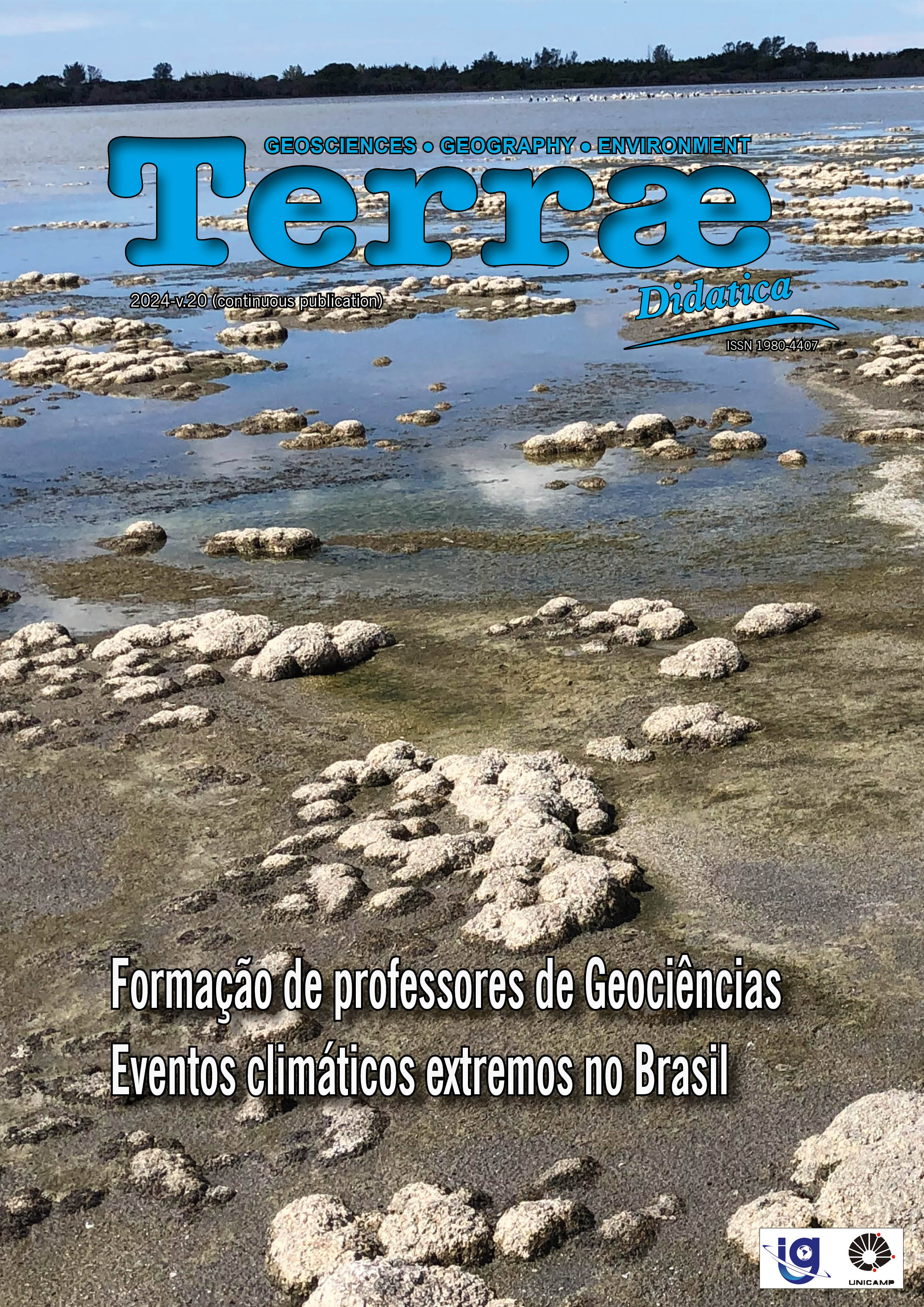Abstract
Introduction and Objective. This article examines the propositions of the National Curriculum Parameters (NCP) for Elementary School and the deliberations recommended by the National Common Curriculum Base (BNCC) for Brazilian institutions and education networks. Methodology. The methodology of content analysis and literature review was used, from a holistic perspective, to assess how the themes on Earth Sciences and climate change are presented, addressed and distributed in the curricular components. Results. After the homologation of the BNCC, there is a concentration of concepts and elucidations of processes and terrestrial phenomena in the discipline Sciences, while the discipline Geography is responsible for correlating the concepts to the socio-environmental and economic problems. There is a great dispersion and decontextualization of geoscientific themes, which hinder the systemic and holistic understanding of the Earth System and the current socio-environmental problem. Conclusion. In agreement with the literature that supports the argumentation of this interdisciplinary pedagogical practices and/or the advent of a specific curricular component of Earth Sciences as an alternative to systematize and contextualize geoscientific themes.
References
Bardin, L. (1977). Análise de conteúdo Lisboa: Edições 70. URL: https://edisciplinas.usp.br/pluginfile.php/7684991/mod_resource/content/1/BARDlN__L._1977._Analise_de_conteudo._Lisboa__edicoes__70__225.20191102-5693-11evk0e-with-cover-page-v2.pdf. Acesso Acesso 03.11.2023.
Brasil. Ministério da Educação. (1995). Parâmetros Curriculares Nacionais. Documento Introdutório. Versão Preliminar. Brasília: MEC/SEF. URL: http://portal.mec.gov.br/seb/arquivos/pdf/introducao.pdf. Acesso Acesso 11.11.2023.
Brasil. Ministério da Educação. (1996). Lei de Diretrizes e Base da Educação Nacional. Lei nº 9.394/96, de 20 de dezembro de 1996. Brasília: MEC/SEF. URL: http://www.planalto.gov.br/ccivil_03/Leis/l9394.htm. Acesso Acesso 11.11.2023.
Brasil. Ministério da Educação. (1997). Parâmetros Curriculares Nacionais (1ª a 4ª séries). Brasília: MEC/SEF. URL: http://portal.mec.gov.br/expansao-da-rede-federal/195-secretarias-112877938/seb-educacao-basica-2007048997/12640-parametros-curriculares-nacionais-1o-a-4o-series. Acesso 11.11.2023.
Brasil. Ministério da Educação. (1998). Parâmetros Curriculares Nacionais (5ª a 8ª séries). Brasília: MEC/SEF. URL: http://portal.mec.gov.br/expansao-da-rede-federal/195-secretarias-112877938/seb-educacao-basica-2007048997/12657-parametros-curriculares-nacionais-5o-a-8o-series. Acesso 11.11.2023.
Brasil. Ministério da Educação. (1999). Ministério da Educação. Parâmetros Curriculares Nacionais: Ensino Médio. Brasília: Ministério da Educação. Brasília: MEC/SEF. URL: http://portal.mec.gov.br/seb/arquivos/pdf/blegais.pdf. Acesso Acesso 11.11.2023.
Brasil. Ministério da Educação. (2017). Base Nacional Comum Curricular. Brasília: Ministério da Educação. URL: http://basenacionalcomum.mec.gov.br/images/BNCC_EI_EF_110518_versaofinal_site.pdf. Acesso 11.11.2023.
Bush, D., Sieber, R., Seiler, G., & Chandler, M. (2016). The teaching of anthropogenic climate change and earth science via technology-enabled inquiry education. Journal of Geoscience Education, 64(3), 159-174. doi: https://doi.org/10.5408/15-127 .
Carneiro, C. D. R., Toledo, M. C. M. de, & Almeida, F. F. M. de. (2004). Dez motivos para a inclusão de temas de Geologia na Educação Básica. Revista Brasileira de Geociências, 34(4), 553-560. doi: https://doi.org/10.25249/0375-7536.2004344553560 .
Compiani, M. (2005). Geologia/Geociências no ensino fundamental e a formação de professores. Geologia USP. Publ. Esp., 3, 13-30. doi: https://doi.org/10.11606/issn.2316-9087.v3i0p13-30 .
Compiani, M., & Cunha, C. A. L. S. (1992). O ensino de Geociências nos 3 graus de escolaridade: um panorama do Brasil. In: Simposios: III Congreso Geológico de España y VIII Congreso Latinoamericano de Geología. Universidad de Salamanca. p. 342-352. URL: https://www.academia.edu/31393917/IIICongresoGeologicoEspa%C3%B1_1992_O_ensino_de_Geoci%C3%AAncias_nos_3_graus_de_escolaridade_um_panorama_do_Brasil. Acesso 14.11.2023.
Compiani, M., & Paschoale, C. (1990). Geologia como forma de conhecimento sintético e histórico sobre o planeta e sua adequação ao ensino de Ciências. In: Simp. Ens. Geol., 6., 1990, Tenerife, Espanha. Anais... Tenerife: Universidad de la Laguna, 1990. p. 21-33.
Hestness, E., McDonald, R. C., Breslyn, W., McGinnis, J. R., & Mouza, C. (2014). Science teacher professional development in climate change education informed by the Next Generation Science Standards. Journal of Geoscience Education, 62(3), 319-329. doi: https://doi.org/10.5408/13-049.1 .
IPCC. Intergovernmental Panel on Climate Change. (2021). Climate Change 2021: The Physical Science Basis. In: Masson-Delmotte, V. P., Zhai, P., Pirani, A., Connors, S. L., Péan, C., Chen, Y., …. Caud, N. (Eds.) (2021). Climate Change 2021: The Physical Science Basis. Contribution of Working Group I to the Sixth Assessment Report of the Intergovernmental Panel on Climate Change. Cambridge, United Kingdom and New York, NY, USA: Cambridge University Press, 2.391p. doi: https://doi.org/10.1017/9781009157896 .
King, C. (2008). Geoscience education: an overview. Studies in Science Education, 44(2), 187-222. doi: https://doi.org/10.1080/03057260802264289 .
Monroe, M. C., Plate, R. R., Oxarart, A., Bowers, A., & Chaves, W. A. (2019). Identifying effective climate change education strategies: A systematic review of the research. Environmental Education Research, 25(6), 791-812. doi: https://doi.org/10.1080/13504622.2017.1360842 .
Nuñez-Rodríguez, J. (2021). Educación para el cambio climático: ¿Por qué formar para afrontar la incertidumbre, vulnerabilidad y complejidad ambiental? Revista Electrônica Educare, 25(2), 1-12. doi: https://doi.org/10.15359/ree.25-2.28 .
Paschoale, C. 1989. Geologia como semiótica da Natureza. São Paulo: Pontifícia Universidade Católica. 138p. (Dissert. Mestrado).
Ponte, M. L., & Piranha, J. M. (2020). As Ciências da Terra no currículo do Estado de São Paulo: uma abordagem reflexiva. Terræ Didatica, 16(Publ. Contínua), 1-13, e020005. doi: https://doi.org/10.20396/td.v16i0.8656550.
Pontuschka, N. N., Paganelli, T. I., & Cacete, N. H. (2007). Para ensinar e aprender geografia. São Paulo: Cortez, 2007. URL: http://www.educadores.diaadia.pr.gov.br/arquivos/File/deb_nre/ensinar_aprender_geografia.pdf. Acesso 12.10.2023.
Stevenson, R. B., Nicholls, J., & Whitehouse, H. (2017). What is climate change education?. Curriculum Perspectives, 37, 67-71. doi: https://doi.org/10.1007/s41297-017-0015-9 .
Toledo, M. C. M. (2005). Geociências no ensino médio brasileiro-Análise dos Parâmetros Curriculares Nacionais. Geologia USP. Publicação Especial, 3, 31-44. doi: 10.11606/issn.2316-9087.v3i0p31-44.
United Nations Framework Convention on Climate Change. UNFCCC. (1992). United Nations Framework Convention on Climate Change. United Nations. URL: https://unfccc.int/resource/docs/convkp/conveng.pdf. Acesso 15.11.2023.
Vosgerau, D. S. R., & Romanowski, J. P. (2014). Estudos de revisão: implicações conceituais e metodológicas. Rev. Diálogo Educ., 14(41), 165-189. URL: https://periodicos.pucpr.br/dialogoeducacional/article/view/2317. Acesso 15.02.2024.
Wibeck, V. (2014). Enhancing learning, communication and public engagement about climate change: some lessons from recent literature. Environmental Education Research, 20(3), 387-411. doi: https://doi.org/10.1080/13504622.2013.812720 .
Zezzo, L. V., & Coltri, P. P. (2022). Educação em Mudanças Climáticas no contexto brasileiro: uma revisão integrada. Terræ Didatica, 18(Publ. Contínua), e022039, 1-12. doi: https://doi.org/10.20396/td.v18i00.8671305.

This work is licensed under a Creative Commons Attribution 4.0 International License.
Copyright (c) 2024 Marcos Zacarias Farhat Junior, Wagner da Silva Amaral, Priscila Pereira Coltri


